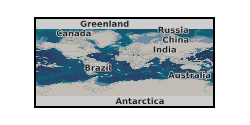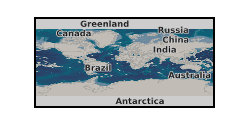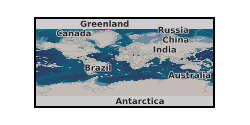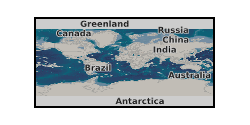University of Nottingham
Type of resources
Available actions
Topics
Keywords
Contact for the resource
Provided by
Years
Formats
Representation types
Update frequencies
Resolution
-
Three files describe behavioural trials involving jumping spiders, crab spiders and praying mantises respectively. They include details about the individual predators, the stimuli used and the behavioural responses from the predators. Full details about this nonGeographicDataset can be found at https://doi.org/10.5285/ee7ba05a-449b-466e-840c-8de1d3f1d4d1
-

The solubility of water (H2O) in carbon dioxide (CO2) and nitrogen (N2) mixtures (xN2 = 0.050 and 0.100, mole fraction) has been investigated at 25 and 40 degrees C in the pressure range between 8 and 18 MPa. The motivation for this work is to aid the understanding of water solubility in complex CO2-based mixtures, which is required for the safety of anthropogenic CO2 transport via pipeline for carbon capture and storage (CCS) technology. The measurements have been performed using an FTIR spectroscopic approach and demonstrate that this method is a suitable technique to determine the concentration of water in both pure CO2 and CO2 + N2 mixtures. The presence of N2 lowers the mole concentration of water in CO2 by up to 42% for a given pressure in the studied conditions and this represents important data for the development of pipelines for CCS. This work also provides preliminary indications that the key parameters for the solubility of H2O in such CO2 + N2 mixtures are the temperature and the overall density of the fluid mixture and not solely the given pressure of the CCS mixture. This could have implications for understanding the parameters required to be monitored during the safer transportation of CO2 mixtures in CCS pipelines. The paper is available at http://www.sciencedirect.com/science/article/pii/S1750583615000444, DOI: 10.1016/j.ijggc.2015.02.002. UKCCSRC Grants UKCCSRC-C1-21 and UKCCSRC-C2-185.
-

This poster on the UKCCSRC Call 2 project, Measurement of water solubility limits of CO2 mixtures to underpin the safe pipeline transportation of CO2, was presented at the Cranfield Biannual, 21.04.15. Grant number: UKCCSRC-C2-185.
-

This poster on the UKCCSRC Call 2 project, Measurement of water solubility limits of CO2 mixtures to underpin the safe pipeline transportation of CO2, was presented at the Cardiff Biannual, 10.09.14. Grant number: UKCCSRC-C2-185.
-
Fluid pH and major and minor element data from shale-acidic fluid interaction laboratory experiments

This dataset presents major (ICP-OES) and minor (ICP-MS) element data and fluid pH during interaction of simulated fracturing fluids with the Bowland-Hodder shale at a variety of conditions, i.e. fluid acidity (pH 1-5), temperature (25-70 C), and rock/fluid ratio (from 0.2:200 to 20:200), as well as two end member mineralogical compositions (from 618 m depth and 673 m depth). The data was collected under the SECURe (Subsurface Evaluation of CCS and Unconventional Risks funded under the European Union’s Horizon 2020 research and innovation programme under grant agreement number 764531. Data supplied by permission of University of Nottingham and British Geological Survey.
-
The data comprise measurements of the 'soluble', 'adsorbed' and 'organically bound' 99Tc concentrations in a diverse set of soils following experimental addition of 99TcO4- and incubation in the laboratory under controlled temperature conditions for 897 days. The long term behaviour of 99Tc in aerobic soils was studied by conducting a laboratory-based experiment in which a set of 20 topsoils from central England with contrasting properties (e.g. pH, organic matter content, land use) were contaminated with 99TcO4- and incubated in the dark, in a moist but aerobic condition, at a temperature of 10 deg C for 2.5 yr. The physico-chemical transformations of 99Tc in each soil microcosm were periodically monitored by means of a three-step sequential extraction procedure conducted on subsamples of incubated soil. The resulting dataset enabled quantification of the kinetics of 99Tc transformation in aerobic soils as a function of soil properties and land uses (arable, grassland and moorland/woodland). The data will be useful in developing models of long-term 99Tc bioavailability in aerobic soils under temperate conditions. Full details about this dataset can be found at https://doi.org/10.5285/4622f906-e28a-4210-aa03-d2e4169b1be8
-
Bird data comprises point counts of bird species and their abundance observed at each collection site. Data are separated into birds within 50m, greater than 50m distant and birds in flight. These data were collected from the South Fork McKenzie river, Oregon, USA in June 2021 following the Holiday Farm wildfire in Autumn 2020. Samples were collected from a restored and unrestored reach of the South Fork McKenzie River with a view to quantifying differences in avian response to wildfire in the restored vs. unrestored river reaches. The study was conducted by the University of Nottingham, with data collected by partners from The US Forest Service, Portland State University, Washington State University and Colorado State University. Funding for the work was received from the Natural Environment Research Council. Full details about this dataset can be found at https://doi.org/10.5285/dd919c8e-ccd6-48ed-a1c0-ef5cf732bdc6
-
The data comprise measurements of the 'soluble', 'chemically exchangeable' and 'isotopically exchangeable' U concentrations in a diverse set of soils following experimental addition of UO22+ and incubation in the laboratory under controlled temperature conditions for ca. 1.7 years. The long term behaviour of U in aerobic soils was studied by conducting a laboratory-based experiment in which a set of twenty topsoils from central England with contrasting properties (e.g. pH, organic matter content, land use) were contaminated with a solution containing UO22+ in soluble form and incubated in the dark, in a moist but aerobic condition, at a temperature of 10 deg C for 619 days. The transformations of U in each soil microcosm were periodically monitored by means of soil extractions conducted on subsamples of incubated soils. The resulting dataset enabled quantification of the kinetics of UO22+ transformations in aerobic soils and the relationships with soil properties and land uses (arable, grassland and moorland/woodland). The dataset will be useful in developing models of long-term U bioavailability in aerobic soils under temperate conditions. Full details about this dataset can be found at https://doi.org/10.5285/0d8b2aea-574c-4cff-a8bd-17115a0b90fc
-
These data describe individual behaviour during an experiment investigating chick responses to 3D-printed insect replicas. Data describe chick progress through an initial training period, during which they open lids of small dishes and consume mealworms, and then during a testing trial, in which they approach and open dishes on which were placed 3D-printed insect replicas. Also included are chick growth curves (daily weights in g) for the period of the experiment. Full details about this nonGeographicDataset can be found at https://doi.org/10.5285/2348b53a-77f7-4293-8060-1a66fe4cea93
-
This dataset relates to two closely related experiments conducted using similar methodologies: one - Discrimination Ability experiment - from December 2021 to May 2022 and another - Multiple Models experiment - from October 2022 to April 2023. Data describe the responses of wild birds (mainly Great tits Parus major) towards feeding stations where insect-like stimuli concealed a possible food reward. Data include: Passive Integrated Transponder (PIT) tag records of birds visiting the feeders (note that not all birds were tagged); demographic information about the tagged birds; timings and set-up of the feeders used at each session; and which stimuli from each session were “attacked” (and in what order). Full details about this dataset can be found at https://doi.org/10.5285/a1c9b0cc-5585-49c5-a38f-fe05240edccf
 NERC Data Catalogue Service
NERC Data Catalogue Service